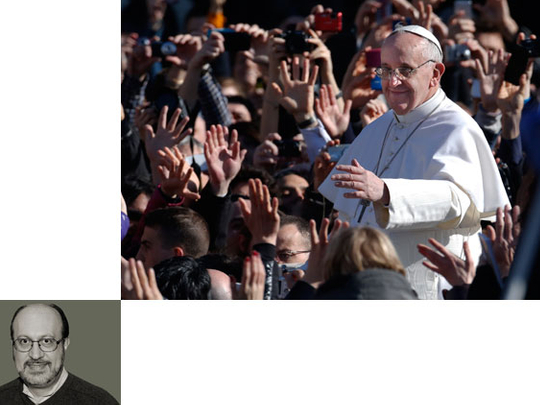
Just as Christine Lagarde and her International Monetary Fund (IMF) acolytes raided Cypriots by insisting that Nicosia accept an immediate tax of up to 10 per cent on all savings accounts, the Roman Catholic Church elected a Pope who stood by the poor. Pope Francis, who emulated St Francis of Assisi — a man born into wealth, who gave up all earthly goods to serve the downtrodden — wished a more modest enterprise. He pledged to serve “the poorest, the weakest, the least important” in his inaugural homily, stressing that authentic power was service to “the whole of humanity,” especially “the hungry, the thirsty, the stranger, the naked, the sick and those in prison.”
To be sure, the Cypriot robbery was but a single episode in the ongoing post Cold-War polarisation in which powerful nation-states re-evaluated their social contracts, ostensibly to retain whatever influences they had left, while the rest of the world did its level best to deny those with absolute authority usurped privileges. Consequently, it was safe to state that mankind was going through a particularly difficult period, even if sparks of light shone from time to time.
Now comes a man in white, who prefers humility to arrogance, who asks believers to bless him rather than the other way around, who bows his head in front of masses, who continues to wear his black shoes rather than go for red Pradas, who pays his hotel bills even after acceding to the leadership position of 1.2 billion people, who takes the bus with cardinals who just elected him instead of checking out his fancy limousine, who wears his iron cross instead of donning a golden one encrusted with diamonds, who puts on a simple clerical collar rather than wear a fur cape, who shakes hands, cracks jokes and invites people to have a good Sunday as well as a good lunch.
Much will be written about Cardinal Jorge Mario Bergoglio, now Pope Francis, including the mystery surrounding his country’s tragic dictatorship under General Jorge Rafael Videla who deposed Isabel Martínez de Peron in 1976, and misruled Argentina until 1981. Although critics stressed that Cardinal Bergoglio neglected to assist two Jesuit priests caught in the dictatorship’s vicious web, it was under his leadership that the country’s bishops issued an apology in 2012, for the overall failures of the church to protect its flock.
A few days ago, the pope combined the serious with a touch of humour to drive home a key point that defined his personality, namely that the Catholic Church ought to go back to basics or risk becoming a “pitiful NGO”. He spoke to pilgrims at St Peter’s Square last Sunday, when he told the story of an elderly Argentine woman who had told him that if God did not forgive sins, the world would not exist. “I felt like asking her: ‘Did you study at the Gregorian?’”, joked the Pope, making a reference to the university that graduated doctrinaire Jesuits. Were he an unforgiving person, and as a Jesuit, Cardinal Bergoglio could have chosen the name Clement XV to avenge Jesuits after Clement XIV dissolved the order in 1773, but he saw the name Francis as more appropriate to truly illustrate what it meant to care about the poor and to restore man’s dignity.
He knew that to err was human, but to forgive divine and as the first foreign pope since the Syrian Gregory III (731-741), he raised the bar quite high for those who enjoyed a millennial monopoly.
To be sure, Pope Francis displayed a conservative outlook, but entertained liberal ideas too because he realised that it was critical for nations to learn how to co-exist. Here was a clergyman who was equipped to establish bridges to other cultures and religions, not only to the other two monotheistic faiths — Judaism and Islam — but also to Hindus, Buddhists, Shintos and many other nations.
More important, here was a cleric who wanted a church that delved less in politics and focused more on faith. That was, perhaps, the best news yet since Pope Francis truly needed to reform the Curia and punish, yes punish, paedophile priests who breached every imaginable principle. Equally important, one hoped that the pope would quickly initiate the long procedure that would allow Catholic priests to marry and have families of their own, as only such a transformation would bring sorely-needed psychological balance to the frail.
It was good to have a relaxed pope who behaved in public just like he acted in private. This tango-loving Argentine was a natural and at ease with himself, which certainly was a good omen, though his writ, one that was immensely critical in the 21st century, was to hammer at injustice. One anticipated and prayed that he would call dictators on their barbarisms and chastise robber barons for stealing from the poor to enrich the privileged. Watch out Christine Lagarde. Here comes Francis.
Dr Joseph A. Kechichian is the author of Legal and Political Reforms in Saudi Arabia.









